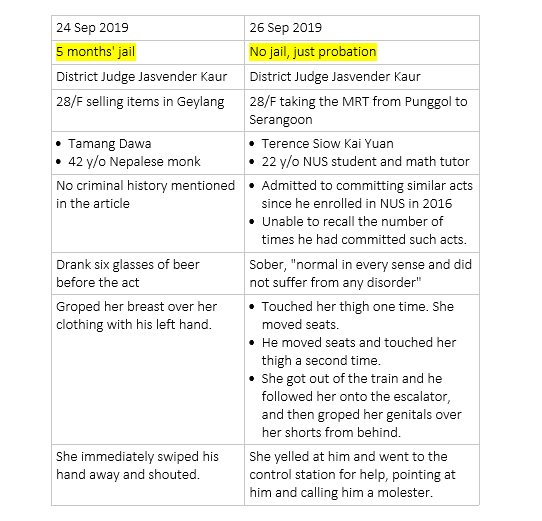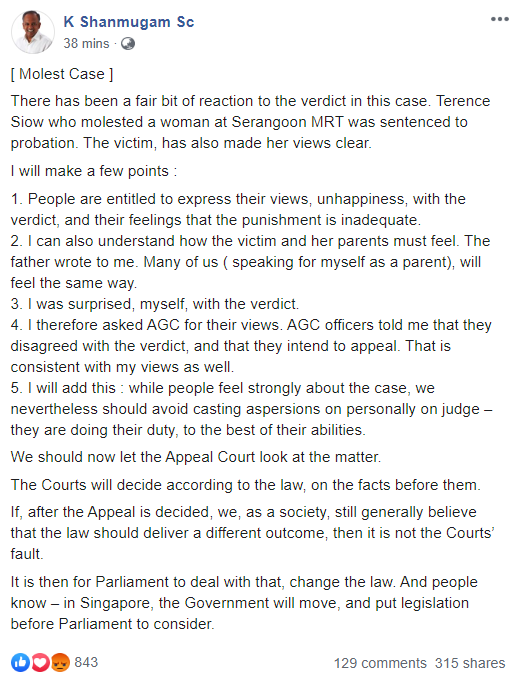Giving Probation To NUS Student For Molest Sends Out Wrong Message To Singaporeans
This piece is part of MS Speaks, a segment in which MS News reporters share their honest views on current affairs and trending topics.
There are lessons not learned from the Monica Baey case on dealing with sex offenders in universities, it seems.
The topic of young male sex offenders getting away with what amounts to a slap on the wrist has now been reignited, no thanks to reports that a 23-year-old man named Terence Siow has been given probation for molesting a woman on a train and in an MRT station.
Why only probation?
Because, and I quote District Judge (DJ) Jasvender Kaur: “Looking at the nature of intrusion, I would say it is minor.”
She went on to say that Siow had “merely touched her briefly” on the thigh.
Siow was also considered eligible for probation because he has “potential to excel in life”.
There are two problems with what she said.
The first is that the molest was “minor”.
The second is her reason for not sending him to jail: because he is getting good grades at NUS.
Unfortunately, her words are sending out the wrong message to Singaporeans — that they can commit crimes and get away with them because they excel academically.
Victims of sex offences aren’t staying quiet anymore
When Monica Baey went public with her story, it sparked heated discussions on how authorities were dealing with such offenders.
But she also faced criticism for speaking out.
These people who criticised her, as well as authorities at both NUS and the courts, one argues, are participating in the diminishing of the victims’ experiences.
But the case would never have made national headlines if Ms Baey didn’t take what is an extremely courageous step to speak up publicly, knowing the criticism that would inevitably arise.
Nicholas Lim was going to lead a normal life because the case had been dealt with internally with no criminal record, while Ms Baey will have to deal with the trauma of being filmed in the shower for the rest of hers.
Karmen Siew, the victim involved in the Terence Siow case, has also gone public despite a court order to not reveal her name.
She had previously written a lengthy Facebook post back in 2018 describing her experience. The post is no longer publicly available on Facebook.
In an interview with The New Paper, she revealed that she now feels uncomfortable wearing shorts in public and prefers to take the lift instead of the escalator – a remnant of the trauma caused by being molested on an escalator.
One would not address such a trauma as “minor”.
What is worse is that these victims are indirectly being told that being peeped at in the shower or being molested in an MRT station is “minor” compared to the lives of the perpetrators.
It is very important that these people are heard, and not have their voices brushed under the carpet by both the authorities and the public by the ones who have violated them.
Comparison to similar case drives home point of double standards
A recent reported case of a molestation case involving a monk on The Straits Times further highlights what Siow really got away with.
Tamang Dawa, a 42-year-old Nepalese monk, received a 5-month jail sentence, while 23-year-old NUS undergraduate Terence Siow received probation.
The judge presiding over both cases was DJ Kaur.
A MS News reader sent in a side-by-side comparison between the two cases. 
On the surface, with the facts of these 2 cases placed side-by-side, one might come to the conclusion that Siow’s educational background spared him a harsher sentence.
And this fact has touched the nerve of Singaporeans.
Singaporeans not taking the case lightly
Singaporeans have expressed their disgust at the light sentence, especially the part about having the “potential to excel”, and that is a good thing, because it means people aren’t taking this case lightly.
Siow admitted to committing other offences since enrolling in NUS in 2016.
Someone who cannot control his sexual urges needs to be kept away from public places.
What he did will leave a mark, not only on his transcript but also on the individuals he violated.
The bottom line is that “potential to excel” should not factor into crimes of a sexual nature; the authorities need to take these cases even more seriously because they violate a person’s rights and they may re-offend.
Otherwise, trust in the authorities to handle sex crime cases when faced with a well-educated perpetrator will fall.
It may even send out the message that it’s “okay” to commit crimes if you’re of a good educational background.
Unhappiness is fine but anger cannot turn personal
Minister of Law K. Shanmugan has weighed in on the issue, with a key takeaway being that personal attacks on judges should not be made.
They are after all, just doing their job.
The Attorney-General’s Chambers are also planning to appeal, according to Shanmugam.
DJ Kaur’s comments may have touched a nerve, but we have to remain classy and not do anything that would threaten her personal safety.
The Appeal Court now has a chance to assuage fears that others with a similar background will be let off.
Doing so would reassure Singaporeans that justice is blind to one’s status or educational background, which is the least that we ask for.
Featured image adapted from The Online Citizen and Google Maps.

Drop us your email so you won't miss the latest news.










